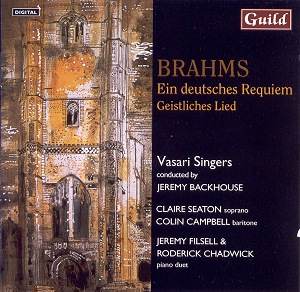On this new disc the
Vasari Singers under Jeremy Backhouse,
try to take us into Brahms’s parlour.
He produced this chamber version of
the Requiem so that it could be run
through in domestic circumstances. Whether
this sort of adaptation should be used
for commercial performance really depends
on how convincing the performance is.
You can see why conductors
would want to perform this version:
it allows them to bring the greater
subtlety and control of a chamber choir
to a larger-scale work. I imagine that
many conductors who have worked on the
orchestral version, dream of working
with a choir every one of whose members
is completely attuned to his requirements.
So it is on this disc,
where the Vasari Singers provide Backhouse
with a wonderful choral clarity of sound.
Their phrasing is invariably sensitive
and rarely have I heard this work so
beautifully shaped. With tempos on the
brisk side, this is a light, bright
version of the work.
With composers’ own
piano arrangements of their large-scale
pieces, it is sometimes possible to
gain insights into how they viewed the
original work; what they choose to include,
omit or highlight can be interesting.
But too much of this arrangement sounds
like dark rumbling; no amount of pianistic
finesse from Jeremy Filsell and Roderick
Chadwick can disguise that rather routine
nature of the adaptation. Frankly the
sustained dark orchestral tones which
are common in this work cry out for
the sort of creative re-working which
Liszt provided for some of his piano
transcriptions.
Talented though the
pianists are, the pianos are no substitute
for the orchestra when it comes to giving
the sense of intertwining orchestral
lines. In passages such as All Flesh
is Grass, this version lacks the
feeling of orchestral lines entwining
around the choral ones. Perhaps this
is something to do with the recording,
as the pianos sound rather in the background
at all times. The chorus seems to dominate
most of the time. It does not help that,
in the louder passages, the piano inevitably
starts to sound percussive, thus radically
changing the overall sound. In the final
movement, the overall effect starts
to sound disconnected as the choral
phrases lack the overall support of
the cushion of orchestral sound.
What I missed also
was the sheer weight of choral sound,
the magical effect of hundreds of voices
singing softly. It does not help that
the Vasari Singers’ sound is clear and
bright; fine in earlier music but not
ideal in this dark-hued piece. The singers
are also rather taxed by the piece,
though by and large they cope admirably.
Perhaps the weakest element is the tenor
line, where Backhouse’s tenors seem
unable to deliver the real heft required
by some of this music; even in this
smaller-scale version they sound under-powered.
In a Gramophone review
some years ago John Steane described
one recording of this version of the
Requiem as sounding like a final choral
rehearsal with piano, the orchestra
being expected next week. Steane went
on to praise the version from Accentus
Chamber Choir on Naïve for sounding
like real chamber music. The Vasari
Singers have not quite managed to do
this and the shadow of the rehearsal
room hangs over this performance.
Their baritone soloist,
Colin Campbell, is similarly afflicted
and sings his part as if trying out
for the full orchestral version. You
never get the feeling that he wants
to produce a chamber version and as
a result his part sounds over-projected.
Soprano Clare Seaton
has too fruity a voice for this performance;
perhaps she would work well with orchestra
but here I longed for something far
more silvery. It does not help that
her voice goes a bit steely in the higher
reaches.
The choir also include
a version of the Geistliches Lied
with piano accompaniment. Perhaps
the smaller scale of this work and the
very fleetness and lightness of the
choral writing mean that it seems to
fit the performance better.
I like the idea behind
this recording: doing chamber versions
of major works can often shed new and
interesting lights on the pieces. But
on this disc, the piano arrangement
is simply not interesting in its own
right and the performance does not quite
achieve the chamber textures that are
required.
There are other versions
of this arrangement in the catalogue
and you might be well advised to try
listening to some of them before deciding
which you should buy.
Robert Hugill
There are other versions
of this arrangement and you might be
well advised to try listening to some
of them before deciding which you should
buy. ... see Full Review


